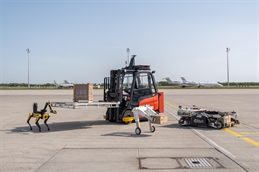
Munich Airport is utilising robots to enhance automation and efficiency by integrating digital technologies into air cargo handling.
The Fraunhofer Institute for Material Flow and Logistics IML, in collaboration with Frankfurt University of Applied Sciences, insurance company KRAVAG, and industrial partners including Cargogate, CHI, Sovereign Speed, and DB Schenker, have demonstrated the initial results of a Digital Testbed Air Cargo (DTAC) research project at Munich Airport.
The DTAC project, which has around €7 million in funding from the German Federal Ministry for Digital and Transport and will run until September 2024, focuses on optimizing the efficiency and performance of the airfreight transport chain.
Boston Dynamics' "robot Spot," equipped with a scanner and 4K camera, autonomously patrolled the warehouse, identifying large storage pallets ready for storage and their corresponding locations.
An autonomously operating forklift transported cargo to an automated high-bay warehouse, while the omnidirectional and highly dynamic robot O³dyn, developed by Fraunhofer IML, moved Euro pallets to a nearby warehouse.
"The cooperation between Fraunhofer IML and Munich Airport is future-oriented. Considering the increasing volume of air cargo and the staff recruitment challenges, digitalization and robotics will help us make cargo and baggage handling more efficient and jobs in these areas more attractive in the near future," said Jan-Henrik Andersson, Munich Airport's chief commercial officer and chief security officer.
Christian Bernreiter, Bavarian State Minister for Housing, Construction and Transport, noted that the demonstration was "convincing" and showed preparedness for current and future challenges.
"This is particularly important in the air cargo industry. The industry has to manage the split between shortage of staff on the one hand and high throughput rates on the other. This will only be successful if we make use of all the technological developments available to us for process optimization," he said.
During the demonstration at Munich Airport, not all process steps were fully autonomous, and some processes were controlled manually. However, the researchers believe that the degree of automation in air cargo handling will increase rapidly.
"On the hardware side, as today has clearly shown, we are already well advanced. In the future, artificial intelligence will support us in coordinating and controlling the vehicles. It will provide the necessary tools and algorithms with which we can precalculate the routes of the autonomous robots and safely avoid collisions," said Michael Henke, executive director of Fraunhofer IML.
"Ultimately, we will soon have fully autonomous systems that will make the air cargo industry fit for the future," Henke added.



